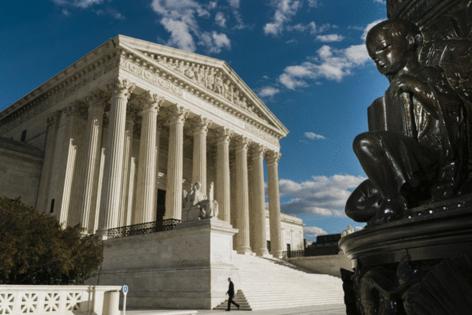Supreme Court curtails judicial scrutiny of environmental reviews
Published in Political News
WASHINGTON — The Supreme Court narrowed federal judicial scrutiny of environmental reviews by federal agencies, ruling Thursday that courts should defer to agency decisions about the scope and content of statements on the environmental effects of a project.
The decision also finds that while those agency impact statements need to address the environmental effects of the project at hand, the statements do not have to consider the effects of separate projects.
The court’s majority, in an opinion written by Justice Brett M. Kavanaugh, found that an appellate court did not provide the U.S. Surface Transportation Board with “substantial judicial deference” in a case tied to the approval of an 88-mile stretch of railroad line in Utah.
The decision reversed a lower court ruling from the U.S. Court of Appeals for the District of Columbia Circuit, which held that the board should have reviewed broader potential impacts from the Utah railroad project, including potential dangers to the Colorado River and impacts on Gulf Coast communities from increased oil drilling upstream and increased oil refining downstream.
But the Supreme Court found that appellate court incorrectly interpreted the National Environmental Policy Act, also known as NEPA, to require the board to consider “the environmental effects of upstream and downstream projects that are separate in time or place from the Uinta Basin Railway.”
The majority opinion said courts should strive for “clarity and predictability” where possible in deciding cases that involve the nation’s economy, but some court decisions have “fallen short of that objective.”
“The central principle of judicial review in NEPA cases is deference,” Kavanaugh wrote.
“Courts should review an agency’s (environmental impact statement) to check that it addresses the environmental effects of the project at hand,” the opinion states. “The (statement) need not address the effects of separate projects. In conducting that review, courts should afford substantial deference to the agency as to the scope and contents of the (statement).”
The decision states that the railroad line would “connect Utah’s oil-rich Uinta Basin — a rural territory roughly the size of the State of Maryland — to the national rail network.” That would facilitate the transportation of crude oil from Utah to refineries in Louisiana, Texas, and elsewhere, the decision states, and bring significant economic development and jobs to the basin by better connecting it to the national economy.
Opponents of the project had urged the justices to keep the ruling so that agencies wouldn’t be encouraged to ignore obvious environmental harms from a federally approved project.
The court’s conservative block signed onto the majority opinion, except for Justice Neil M. Gorsuch, who did not take part in the decision. The court’s three liberal justices signed onto a concurring opinion that agreed with the reversal, but said the majority “unnecessarily” grounded its analysis “largely in matters of policy.”
The case is Seven County Infrastructure Coalition v. Eagle County.
©2025 CQ-Roll Call, Inc., All Rights Reserved. Visit cqrollcall.com. Distributed by Tribune Content Agency, LLC.

























































Comments